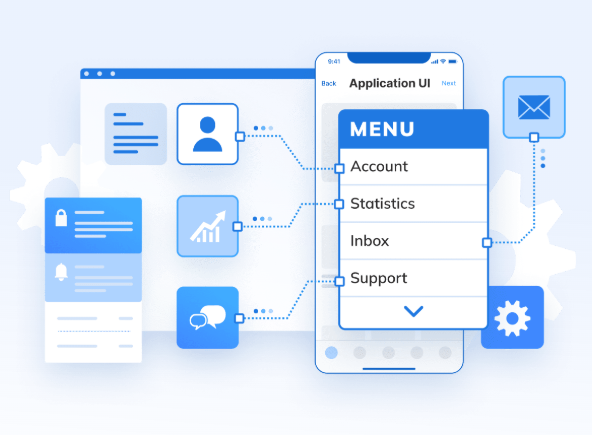Notifications

8 minutes, 43 seconds
-31 Views 0 Comments 0 Likes 0 Reviews

In the fast-paced world of startups, the temptation to scale quickly is ever-present. However, rapid growth without a solid foundation can lead to wasted resources, product-market misalignment, and eventual failure. One of the most strategic steps a startup can take before scaling is investing in Minimum Viable Product (MVP) development. An MVP allows startups to validate their ideas, attract early adopters, and refine their products based on real user feedback. This article explores why MVP development is crucial for startups and how it can pave the way for sustainable growth.
A Minimum Viable Product (MVP) is a version of a product with just enough features to attract early users and validate a business concept. The goal of an MVP is not to launch a perfect product but to test assumptions, gather insights, and iterate based on actual user behavior.
Startups that embrace MVP development gain a competitive edge by:
Reducing development costs and risks
Speeding up time to market
Collecting early user feedback
Attracting investors with a proven concept
One of the most significant risks startups face is building a product that nobody wants. MVP development helps mitigate this risk by allowing startups to test their ideas with real users before making large-scale investments. By launching an MVP, startups can gauge demand, identify target audiences, and refine their value proposition based on actual market responses.
For example, Dropbox initially launched with a simple explainer video showcasing its concept. The overwhelming response validated the demand, allowing the company to move forward with full-scale development.
Developing a full-fledged product from the outset can be costly and time-consuming. Many startups exhaust their budgets on features that may not be necessary or valuable to users. MVP development allows startups to focus on core functionalities, reducing upfront costs and enabling iterative improvements based on real-world feedback.
By investing in custom MVP development services, startups can build a lean yet functional product tailored to their specific needs, ensuring efficient resource allocation.
Speed is crucial in the startup ecosystem. The longer it takes to launch a product, the higher the risk of losing market opportunities to competitors. An MVP accelerates time to market by enabling startups to release a functional product quickly, gather insights, and make informed decisions on further development.
For instance, Instagram started as "Burbn," a location-based app with multiple features. After analyzing user behavior, the team realized that photo-sharing was the most popular feature. This insight led to the launch of Instagram as a focused photo-sharing platform, setting the stage for massive success.
An MVP provides tangible proof of concept, making it easier to attract early adopters and potential investors. Startups that can demonstrate market traction with real user engagement are more likely to secure funding and strategic partnerships.
Investors are more inclined to fund startups with validated business models. A well-executed MVP serves as concrete evidence of a viable product, increasing the chances of securing financial backing for future scaling efforts.
Building an MVP allows startups to adopt a customer-centric approach to development. Rather than assuming what users want, startups can collect valuable feedback and refine their products accordingly. This iterative process leads to better product-market fit and ensures that the final version of the product aligns with user needs and expectations.
For example, Airbnb started as a simple website offering short-term rentals. Continuous iteration based on user feedback transformed it into a global marketplace for accommodation and experiences.
The startup landscape is riddled with uncertainty. Investing in MVP development helps startups mitigate risks by testing assumptions early and making data-driven decisions. This approach prevents costly mistakes and enables startups to pivot if necessary.
Consider how Twitter evolved from "Odeo," a podcasting platform, to a microblogging service based on user behavior insights. By embracing MVP principles, Twitter successfully repositioned itself in the market and became a leading social media platform.
Launching an MVP allows startups to engage with their target audience early on, building a loyal user base. Early adopters often become brand advocates, providing valuable word-of-mouth marketing and helping to shape the product’s future direction.
By involving users in the development process, startups can create a sense of ownership and community, increasing long-term engagement and retention.
To maximize the benefits of MVP development, startups should follow a structured approach:
Start by defining the primary problem your product aims to solve. Understanding your target audience’s pain points will help you prioritize essential features.
Resist the urge to build an overly complex product. Identify the minimum set of features needed to deliver value to users and test your core hypothesis.
Create a prototype or wireframe to visualize your product’s functionality. This step helps in refining the user experience before development begins.
Speed is key in MVP development. Use agile methodologies to develop a functional version of your product and launch it as soon as possible.
Gather qualitative and quantitative feedback from early users. Use this data to make informed decisions about feature enhancements and product improvements.
Based on user feedback, refine your product through iterative updates. Once you achieve product-market fit, you can confidently scale your business.
Investing in MVP development before scaling is a strategic move that can save startups time, money, and resources. By validating market demand, minimizing risks, and adopting a customer-centric approach, startups can lay a solid foundation for long-term success.
For startups looking to build a robust MVP, leveraging custom MVP development services can provide the expertise and guidance needed to create a scalable and market-ready product. Prioritizing MVP development ensures that startups make informed decisions, attract the right investors, and ultimately achieve sustainable growth in a competitive market.
In the dynamic startup ecosystem, those who test, learn, and iterate early have the highest chances of success. Instead of rushing to scale, startups should embrace MVP development as a crucial step toward building a thriving business.

